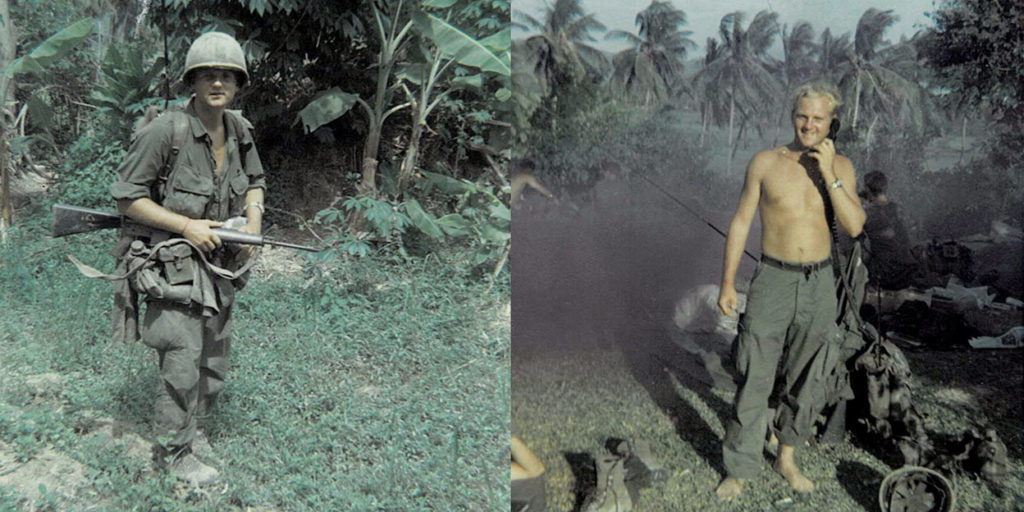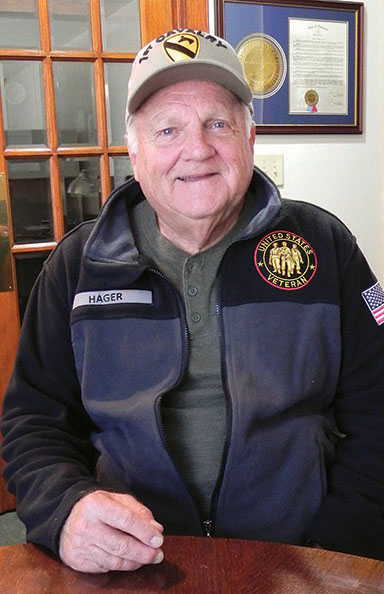
By Bill Derby, Publisher
I’ve known Tom Hager since high school when he played on Science Hill’s two State Championship baseball teams in ’62 and ’63. As a fellow veteran I did know he was in the Army but didn’t know his service experience until two weeks ago when he agreed to tell me his story. I have interviewed many veterans over the past 26 years. Most combat veterans don’t share their experiences. Tom Hager was no exception.
Tom did not tell me this as typical of his quiet demeanor but the fact is, he had one of the most dangerous jobs in Vietnam.
Tom was drafted like many of us in those war years. He received orders for Vietnam and was assigned to the 1st Cavalry Division of the 1st of the 8th Cavalry Delta Company in the Bong Son area of Vietnam. The 1st Cav was noted for their intense combat experience and led the way in many Vietnam battles. Tom was first assigned to carry machine gun ammo but was quickly assigned as the Delta Company’s RTO, (Radio, Telegraph Operator). As an RTO, Tom was constantly at the side of his company commander, an artillery officer, to ensure immediate communication.
Hager said, “Our Company was constantly on the move carrying out search and destroy missions on the Bong Son Plains and establishing forward fire bases. We basically spent a year in the jungle living in foxholes with a poncho for a roof.
“Our job was to move out before daylight and surround a village and look for anyone that might be a Viet Cong (VC). In many villages we could see old men and women, small children but no young men. We would then search the village for weapons or even large bags of rice the VC used. One morning a VC saw us coming and started firing at us. We fired back but didn’t find him,” Hager said.
“On Nov. 12th we were in a firefight. In the jungle you can hear the bullets whizzing by your head. We were in constant fear and the will to survive became overwhelming. We were at war and soon began to wonder what are we doing here. It came down to protecting and fighting for your buddy. I don’t know how any of us survived. We lived day by day, hour by hour not knowing what is coming next,” Hager explained. “I was the person to call in the helicopters and pop a smoke grenade. We felt great seeing the gunships come in and fire at the enemy. We were also relieved to be air lifted out and back to base camp. “
Hager said their unit moved north in January 1968 to the I Corps area near the DMZ in a big sweep of the A Shaw Valley. “We soon were in a firefight. It was the Tet offensive by North Vietnam soldiers. From where we were, we could see the Marine base at Khe Sanh getting hit by artillery. They were sitting ducks. It was terrible. Dorsey Williams from Johnson City was killed there.” Hager said sadly.
“We would stay in the field four days and then back at camp on guard duty three days. We were in two significant battles during that time. I kept my radio antenna down since the enemy liked to target RTO’s.” Hager shared.
Tom said that GI’s loved to give the local children candy or food but you had to be really careful. Sometimes the little kid would roll a grenade.
“One night we heard the thump of an M-79 grenade launcher. Rounds started hitting within our camp. The M-79 was an American weapon. The next night we sent out a squad to try and find out who was shooting at us. They captured a person. It was a woman shooting the M-79. She was brought in and questioned but wouldn’t talk. She was eventually sent out on a helicopter,” Hager shared.
“Our company was in several firefights. It would scare you to death wondering where the next round was coming from. The VC were experts at hiding. During these encounters it was great to hear jets coming in to bomb the enemy. The B-52’s were the best at clearing out huge areas of landscape and saving our hides. We loved the sound of the helicopter gunships too. They would bring it on. I was also responsible for calling in the medivac helicopters. They were heroes coming in under fire to take out our wounded. Those were brave guys,” he continued.
“I had five company commanders. All were great. One was a West Point graduate. Another was an ROTC and one had attended OCS (Officer Candidate School). Their worst fear was to lose a soldier. It really affected them. It affected all of us when a buddy was killed. One Sargent who was a terrific soldier, young, great guy was in charge of a platoon. In a firefight he was unfortunately killed. He only had three weeks left before going home. It really got to our commander to lose him,” Hager said.
“It was finally my turn to go on R&R. I had planned to visit Hawaii but I switched with a married guy so he could meet his wife there. I instead went to Australia for a couple of weeks. I had a great time and was glad to be away from the fighting and death,” Tom smiled.
“I don’t know how any of us survived. We looked after each other and you could depend on your buddy next to you. Most of the guys were really brave.”
When Hager returned to his unit in Vietnam his company commander gave him some bad news about their company, “Tom, we were hit badly while you were gone. We’re just a skeleton crew of what we were. We lost many soldiers killed or wounded.”
Tom said, “As a radioman, I liked what I was doing. I didn’t realize or think about it until I got home but I was one of the enemy’s main targets in addition to our officers. I don’t know how any of us survived. We looked after each other and you could depend on your buddy next to you. Most of the guys were really brave.”
When Tom returned home he married his long-time sweetheart, Harriet Atkins Hager, and put the war behind but the terrible memories still lurked in the dark recesses.
Unfortunately, Harriet passed away a few years ago and Tom decided to attend a 1st Calvary reunion in Washington, D.C.
“I didn’t know a sole at the meeting but when I started talking to a couple of guys, it was an instant bond. When you hear the word, ‘brother,’ it was real. I’ve never experienced such camaraderie and developed real friendships,” he said.
Over the years Tom Hager developed close friendships with many in the reunion group sharing their experiences and brushes with death while honoring those who didn’t come home. He plans to continue his reunion relationships with his brothers in arms.
In closing Tom commented, “Our Vietnam veteran’s age group has the fastest rate of death of any veterans group in any war. We had to do what you have to do to survive during war.”




